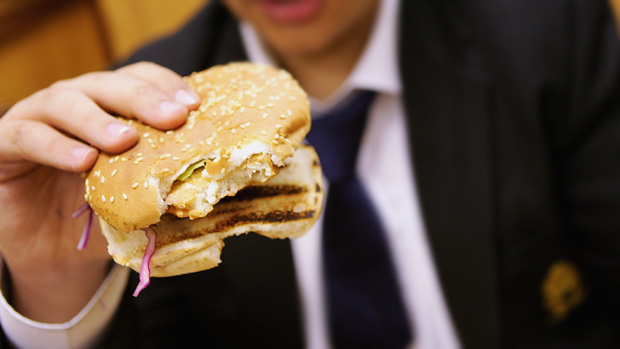Studies giving fat the all clear 'are misleading', say scientists
New report says eating too much saturated fat can lead to heart attacks and stroke after all

A free daily email with the biggest news stories of the day – and the best features from TheWeek.com
You are now subscribed
Your newsletter sign-up was successful
A study published in March that suggested eating a lot of fat may not be bad for you was misleading, nutrition scientists have concluded.
The findings generated a welter of headlines earlier in the year, but despite the claims it now appears that saturated fats in foods including cakes, butter, processed meat and hard cheese are bad for your heart after all.
The reports were based on the findings of Dr Rajiv Chowdhury of Cambridge University, whose team concluded that polyunsaturated fats in olive oils and fish were not necessarily more healthy for us. Chowdhury's research "overturned the assumptions of decades", The Guardian notes. But was his data reliable?
The Week
Escape your echo chamber. Get the facts behind the news, plus analysis from multiple perspectives.

Sign up for The Week's Free Newsletters
From our morning news briefing to a weekly Good News Newsletter, get the best of The Week delivered directly to your inbox.
From our morning news briefing to a weekly Good News Newsletter, get the best of The Week delivered directly to your inbox.
Christine Williams, professor of human nutrition at Reading University, says that research into consumption habits, such as Chowdhury's, is "notoriously problematic" because people tend to under-report the food they have consumed if they know that food is bad for them. "About 60 per cent [of people] when asked what they eat systematically under-report by 20-30 per cent their energy [intake]," she said. "Overweight people are more likely to do so than underweight people."
Tom Sanders, professor emeritus of nutrition and dietetics at King's College London agreed: "People lie about what they eat," he said. "We get served too big portions in pubs and restaurants and then we go and get a coffee and are asked if we want a muffin with that. You go and buy a newspaper and are asked if you want a 100g bar of chocolate and there are high-sugar, high-fat snacks on the way to the counter. A muffin at breakfast can be 600 calories and then you add the latte and it can be 1,000 calories, half your daily recommended intake in one go."
Studies can also arrive at misleading conclusion if they ask people to report on their diets only at one point, such as a particular day or week's worth of eating, and then project forward from that information for years to come.
According to Andy Salter, head of nutritional sciences at the University of Nottingham, almost all studies into the effects of fats, including numerous experiments that have been conducted on both humans and animals, indicate that diets high in saturated fats lead to large amounts of "bad" low-density lipoprotein (LDL) cholesterol in the blood. This cholesterol can build up on the artery walls, leading to disease of the arteries, as well as heart attacks and stroke.
A free daily email with the biggest news stories of the day – and the best features from TheWeek.com
-
 The year’s ‘it’ vegetable is a versatile, economical wonder
The year’s ‘it’ vegetable is a versatile, economical wonderthe week recommends How to think about thinking about cabbage
-
 Moltbook: The AI-only social network
Moltbook: The AI-only social networkFeature Bots interact on Moltbook like humans use Reddit
-
 Judge orders Washington slavery exhibit restored
Judge orders Washington slavery exhibit restoredSpeed Read The Trump administration took down displays about slavery at the President’s House Site in Philadelphia
-
 Home Office worker accused of spiking mistress’s drink with abortion drug
Home Office worker accused of spiking mistress’s drink with abortion drugSpeed Read Darren Burke had failed to convince his girlfriend to terminate pregnancy
-
 In hock to Moscow: exploring Germany’s woeful energy policy
In hock to Moscow: exploring Germany’s woeful energy policySpeed Read Don’t expect Berlin to wean itself off Russian gas any time soon
-
 Were Covid restrictions dropped too soon?
Were Covid restrictions dropped too soon?Speed Read ‘Living with Covid’ is already proving problematic – just look at the travel chaos this week
-
 Inclusive Britain: a new strategy for tackling racism in the UK
Inclusive Britain: a new strategy for tackling racism in the UKSpeed Read Government has revealed action plan setting out 74 steps that ministers will take
-
 Sandy Hook families vs. Remington: a small victory over the gunmakers
Sandy Hook families vs. Remington: a small victory over the gunmakersSpeed Read Last week the families settled a lawsuit for $73m against the manufacturer
-
 Farmers vs. walkers: the battle over ‘Britain’s green and pleasant land’
Farmers vs. walkers: the battle over ‘Britain’s green and pleasant land’Speed Read Updated Countryside Code tells farmers: ‘be nice, say hello, share the space’
-
 Motherhood: why are we putting it off?
Motherhood: why are we putting it off?Speed Read Stats show around 50% of women in England and Wales now don’t have children by 30
-
 Anti-Semitism in America: a case of double standards?
Anti-Semitism in America: a case of double standards?Speed Read Officials were strikingly reluctant to link Texas synagogue attack to anti-Semitism